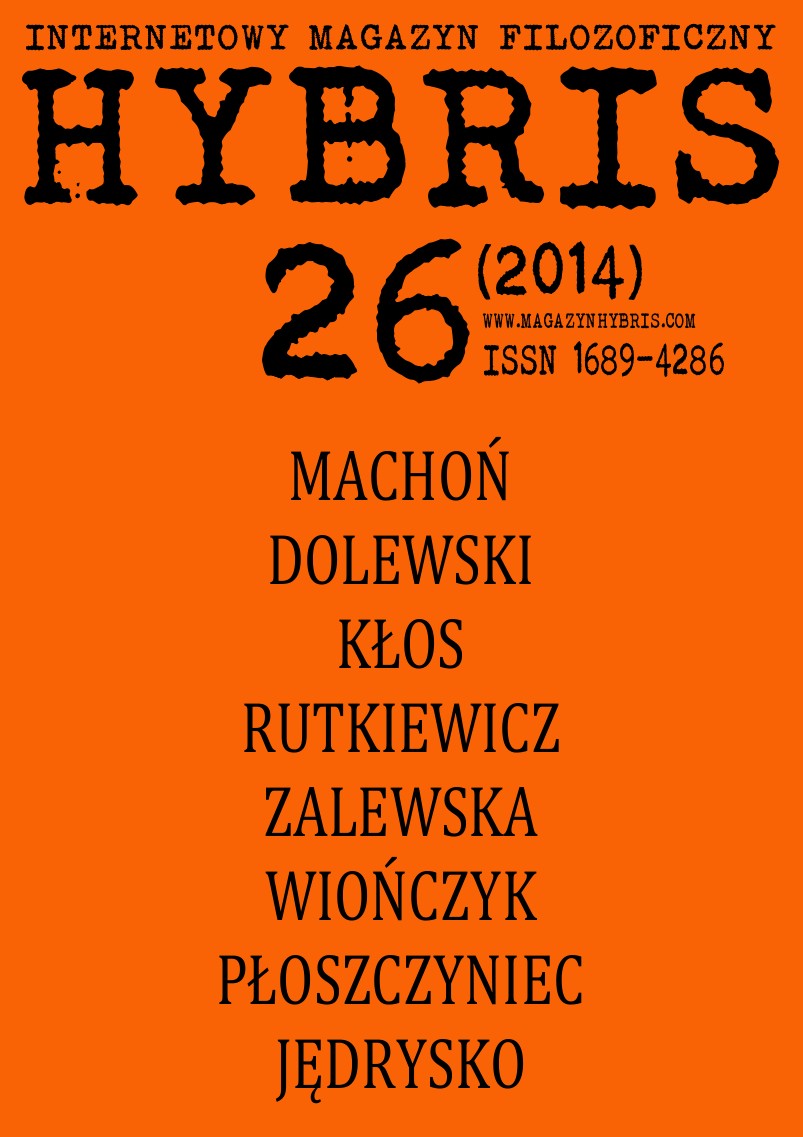The ethopoietic function of writing: how to write to master one’s own identity. On the basis of the late works by Michel Foucault
DOI:
https://doi.org/10.18778/1689-4286.26.03Abstract
The ethopoietic function of writing is a term used to describe the possibility launched by the process of writing to transform theoretical truths into ethos — the rule that governs our vita activa. In his writings Foucault presents the concise, yet detailed, methods of governing and mastering the Self. Seneca’s hupomnēmata are an example of how to integrate theoretical knowledge into the very “body” of the Self. Introducing words into the virtual space between present consciousness and future unconsciousness increases the distance between “I” and death; hence, Foucault concludes that “we write so as not to die.” “Essential affinity between death, endless striving and the self-representation of language” is, in this sense, the condition for the creation of an identity. I would like to present the ways in which Foucault assimilates all these paths to make the aesthetics and ethics of our existence coherent and complete.
References
Deleuze, Gilles, [1990] 2007, [Pourparlers. 1972–1990] Negocjacje 1972–1990, [Les Éditions de Minuit] trans. Michał Herer, Wrocław: Wydawnictwo Naukowe Dolnośląskiej Szkoły Wyższej Edukacji TWP.
View in Google Scholar
Foucault, Michel, [1994] 2000b, [Dits et écrits, 1954–1984] Essential Works of Foucault 1954-1984. Ethics, Subjectivity and Truth, [Paris: Éditions Gallimard] Paul Rabinow (ed.), London: Penguin Books, vol. 1.
View in Google Scholar
Foucault, Michel, [1994] 2000a, [Dits et écrits, 1954–1984] Essential Works of Foucault 1954-1984. Aesthetics, Method, and Epistemology, [Paris: Éditions Gallimard] James Faubion (ed.), London: Penguin Books, vol. 2.
View in Google Scholar
Foucault, Michel, [1994] 2000, Self Writing, [in:] Foucault, Michel [Dits et écrits, 1954–1984] Essential Works of Foucault 1954–1984. Ethics, Subjectivity and Truth. [Paris: Éditions Gallimard] Paul Rabinow (ed.), London: Penguin Books, vol. 1, pp. 207–222.
View in Google Scholar
Foucault, Michel, [1994] 2000, Language to Infinity, [in:] Foucault, Michel [Dits et écrits, 1954–1984] Essential Works of Foucault 1954-1984. Aesthetics, Method, and Epistemology, [Paris: Éditions Gallimard] James Faubion (ed.), London: Penguin Books, vol. 2. pp. 89–101.
View in Google Scholar
Foucault, Michel, [1975] 1991, [Surveiller et punir: Naissance de la prison] Discipline and Punish. The Birth of the Prison, [Paris: Éditions Gallimard] trans. Alan Sheridan, London: Penguin Books.
View in Google Scholar
Foucault, Michel ([1966] 2002) [Les mots et les choses. Une archéologie des sciences humaines] The Order of Things: An Archeology of the Human Sciences, [Paris: Gallimard.] London, New York: Routledge Classics.
View in Google Scholar
Gadamer, Hans-Georg, [1960] 2004, [Wahrheit und Methode. Grundzüge einer Philosophischen Hermeneutik] Truth and Method, [Tübingen: Mohr] trans. Joel Weinsheimer and Donald Marshall, London, New York: Continuum.
View in Google Scholar
Heidegger, Martin, [1927] 1994, [Sein und Zeit] Bycie i czas, [Max Niemeyer Tübingen] trans. Bogdan Baran, Warszawa: Wydawnictwo Naukowe PWN.
View in Google Scholar
Kalaga, Wojciech, 1997, Nebulae of Discourse: Interpretation, Textuality and The Subject, Frankfurt, Berlin, Bern, New York: Peter Lang.
View in Google Scholar
Miller, James, 1993, The Passion of Michel Foucault, New York, London, Toronto, Sydney, Auckland: Anchor Books Doubleday.
View in Google Scholar
Seneca, Lucius Annaeus, 1998, Listy moralne do Lucyliusza, Warszawa: Wydawnictwo ALFA.
View in Google Scholar
Taylor, Charles, [1989] 2010, Sources of the Self. The Making of the Modern Identity, Cambridge, New York, Melbourne, Madrid, Cape Town, Singapore, Sao Paulo, Delhi, Dubai, Tokio: Cambridge University Press.
View in Google Scholar
Heidegger, Martin, [1927] 1962, [Sein und Zeit] Being and Time, [Max Niemeyer Tübingen] trans. John Macquarrie and Edward Robinson, Oxford: Basil Blackwell.
View in Google Scholar
Downloads
Published
How to Cite
Issue
Section
License

This work is licensed under a Creative Commons Attribution-NonCommercial-NoDerivatives 4.0 International License.






